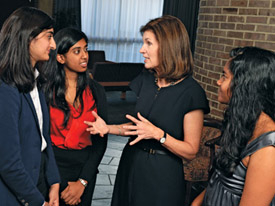Undergraduates unite to host Global Philanthropic Symposium April 19

The traditional concept of philanthropy – large gifts from wealthy benefactors – is getting a major overhaul at Rutgers through the efforts of an energetic group of committed students.
Individually, these students volunteer their time, raise funds and promote awareness for organizations such as the Foundation for the International Medical Relief of Children and the Thakaat Foundation. Yet while they work for specific causes, the students also share humanitarian goals with other community service organizations on campus.
That similarity caused them to think about making a bigger impact.
The student organization leaders realized “if we pooled our resources together, we could do some great things,” says Sindhoori Nalla, president of the Rutgers Children’s AIDS Network. They decided to create “one powerful event.”
Many of the students are public health majors. Their volunteer activities reflect that interest and influenced the planning of their united project, the Global Philanthropic Symposium, a conference on exploring sustainable solutions to socioeconomic issues. At the symposium, students connect with professors and nonprofit professionals to share ideas and envision ways to address significant local and international problems. The first symposium was held in 2012; this year’s event takes place April 19 at the Busch Campus Center.
“We realized all of our business school friends had some way they could get together and apply what they were learning. So did the medical school. But there was really nothing for those in global health and public health,” says Nikhita Thaper, a senior who is president of the March of Dimes Collegiate Council at Rutgers.
The student planners adroitly abbreviated the symposium name to GPS, to echo the theme, “Navigate your way to sustainability.” The 2013 symposium has expanded its attendee list beyond Rutgers to include students and faculty from Harvard, Yale, New York University, the University of Medicine and Dentistry of New Jersey, and others.
Through case studies and discussions with an international perspective, the symposium will explore issues related to global poverty, women’s rights, maternal and child health, infectious diseases, sanitation, climate change, youth activism and education.
“We want to redefine the terms of ‘philanthropic’ and focus on offering resources instead of money,” says Thaper, explaining that this approach is better able to make efforts sustainable. “Just providing (monetary) aid doesn’t mean a specific program will stay once the funds end.”
Small acts can have a big impact, so being philanthropic is “accessible to everyone,” she adds.
That redefined philanthropy has been part of Thaper’s life since she began volunteering with the March of Dimes 10 years ago. “The mission (prenatal health) resonated with me. I have pre-med intentions,” she says. She educates others about having healthy pregnancies and serves on the organization’s national youth council as well as heading the Rutgers group.
Nalla is also a senior and applying to medical school. Her campus organization works with the AIDS program at the Robert Wood Johnson University Hospital in New Brunswick.
“Philanthropy isn’t just donating money. It’s something you can do now and make a difference today,” she says. Nalla has seen her group’s work help patients and their families. “You don’t have to wait years to create a difference in the world.”
This year’s symposium keynote speaker, Francis Barchi, is an associate professor in the School of Social Work. Barchi’s research expertise includes global issues affecting women’s health.
Elizabeth Amaya-Fernandez, an adjunct instructor for the Edward J. Bloustein School of Planning and Public Policy, is faculty adviser to the students organizing the symposium and a health educator at Rutgers Health Services –Health Outreach, Promotion, and Education (H.O.P.E.). She teaches a course on international public health and an alternative spring break course in Nicaragua on global health systems.
“I like how they have shifted the perspective [of philanthropy] and see their role,” says Amaya-Fernandez. “They’re not talking about how they are the future – [their view is] it’s right now. A lot of the young people working on this have been working in different communities, doing this already.”
To foster sustainability of the event itself, GPS organizers are involving younger students as well. First-year student Janna Aladdin volunteers with the Palestine Children’s Relief Fund at Rutgers. She is on the GPS planning committee and helps publicize the symposium.
“I’m interested in sustainable development and women’s empowerment,” says Aladdin, who is considering a major in economics and public policy. She believes GPS will give Rutgers attendees the opportunity to learn more about campus efforts on big issues. “At the grass-roots level, people are much more inclined to find out about the causes and get involved,” she says.